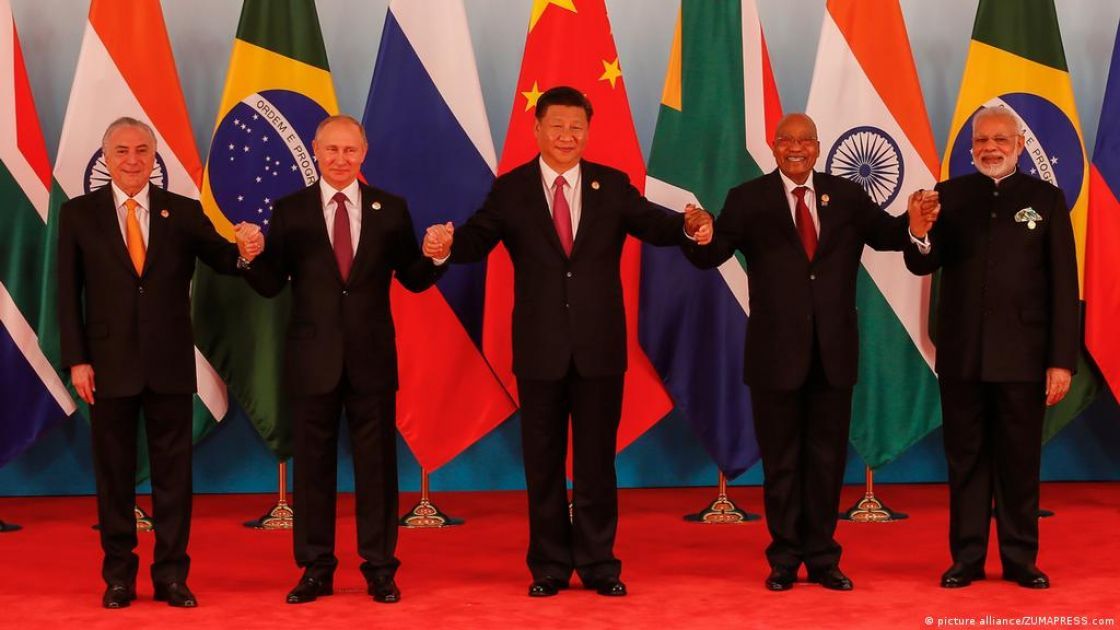- Articles
- Posted
The Peaceful BRICS Hydrogen Bomb! What Happened Between Kissinger-Davos and Putin-Petersburg?
The “relative calm” in the Russian-Western conflict lasted less than a month (between May 23 and June 17), after which things went back to escalating, and at a faster and more violent rate than before.
This article attempts to read the change that took place between the 23rd of last month, the date when British magazine, The Telegraph, published Kissinger’s “shocking” statements about Ukraine, and last Friday, the 17th of this month, the day Putin spoke at Petersburg’s Economic Forum, when he said: “The unipolar system has ended forever!”
In order to show the broad outlines of the intended change, we say that the escalation between the West and Russia has been on the rise for years. However, there is no doubt that that escalation has entered a new phase since February 24, with the start of the “Russian military operation” in Ukraine.
If we try to evaluate the degree of escalation since that date until now, by relying on monitoring the media and political scenes, as well as actual economic and military procedures of the conflict, we can observe three phases:
February 24 – May 23: A quick escalation on a daily basis and in all directions.
May 23 – June 17: A relative calm at nearly the various aspects, accompanied by a set of “shocking” statements, starting with Kissinger, which the entire Western (including European) media and political arsenal soon joined.
June 17 - …: Since after Putin’s statement at the St. Petersburg Forum, escalation resumed, with indicators the escalation started from the level it had previously reached – prior to Kissinger’s remarks – and rising.
How did the “relative calm” manifest?
It might not be necessary to remind of the escalation waves, as news thereof occupied the main space of news and fixation of the entire planet for the last few months. However, what deserves attention is the “relative calm” period, which lasted under a month, between May 23 and June 17.
This period started, as noted above, with Kissinger’s remarks, which were considered shocking at the time. A Kassioun article by the Political Editor and published at the beginning of this month, dealt with these remarks.
Among the things that Kissinger said were the following:
- “Ukraine should give up territory to Russia to end the war”.
- “In my opinion, move towards negotiations and peace must begin in the next two months in order to determine the outcome before the upheavals and tensions begin”.
- “Achieving a neutral status of Ukraine and as a bridge between Russia and Europe is the main objective in the current situation”. “The ideal outcome would be if Ukraine takes place as a neutral country as a bridge between Russia and Europe”.
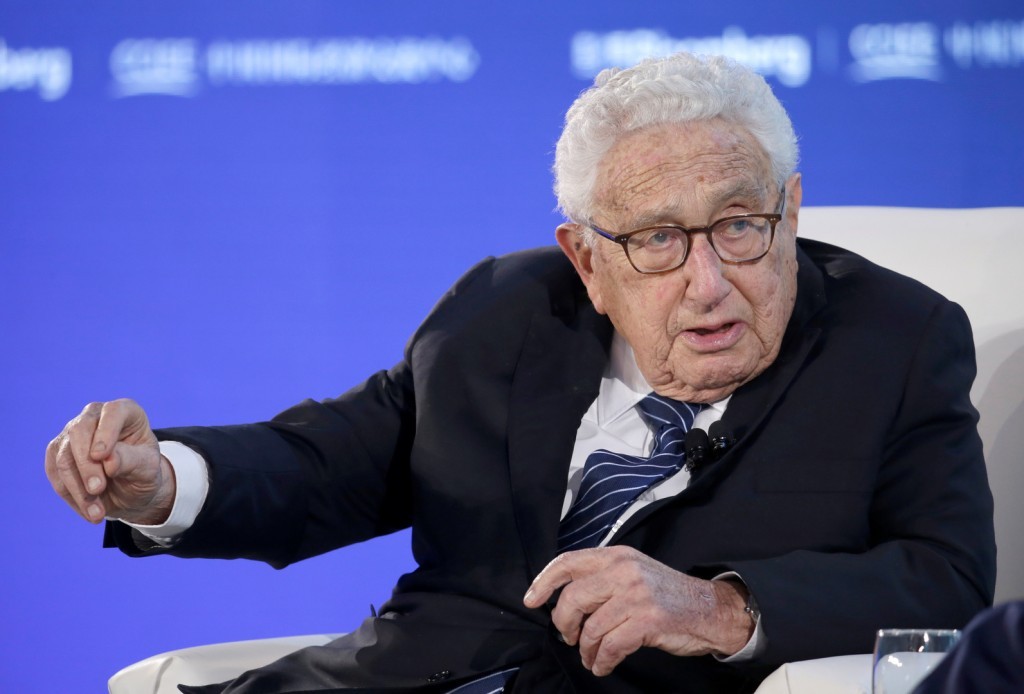
At the time, Kissinger seemed to be “singing solo” apart from the Western media and political choir. However, as the abovementioned article predicted, that was not how things were, as each of Biden, Stoltenberg (NATO’s Secretary General), Macron, Schultz, and others practically repeated the same ideas expressed by Kissinger, albeit less directly.
The statements we are talking about here are those unified ones expressed by Western leaders, in which they said – with very slight differences in wording, possibly more because of the many languages in which these statements were made than difference in ideas – that: “The issue of Ukraine giving up part of its territory in order to have peace, is its own business”. Not to mention the plethora of articles and analyses that occupied first pages, the most important corners, and the most popular political television shows in European media, all of which said in a unified voice that a deal much be sought and that there is no problem in conceding part of Ukrainian territory in exchange for ending the war.
What is humorous regarding Western political leaders’ statements saying that conceding Ukrainian territory is a Ukrainian matter, is that they did not only have the same idea, but also looked the same. In other words, over a period of one week, the same question crystalized in the minds of the journalists who were covering the press conferences of those leaders, though the wording differed slightly (also due to the difference in languages); that question being: “What is your comment regarding the possibility of Ukraine conceding territory to Russia in exchange for ending the war?”
After the Russian army took full control of Azovstal complex on June 21, the battled entered a calmer phase, which started to change and go back to an active level two weeks ago, started with the crucial juncture relating to Severodonetsk city and taking control thereof.
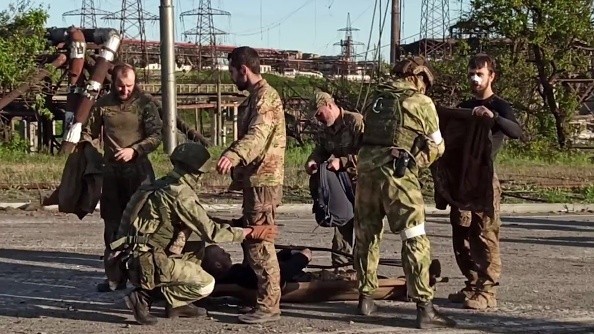
In parallel, the waves of economic sanctions, as well as declarations of Western arms supplies to Ukraine, and combative and generally escalated statements, had all significantly decreased a few days after Kissinger’s statements, and remained low until a few days ago, when they returned to their previous level and are on the rise. We mean statements of the type that Stoltenberg made last Sunday in an interview with the weekly German newspaper Bild, in which he said: “The war in Ukraine may take years”; and Macron, who said: “We support Ukraine and will provide anything we can for it to win this war”, a tone that is even more escalating than the first wave before Kissinger. There is also the additional US military aid package a few days ago, worth a billion dollars, in addition to the new siege of Kaliningrad, and other new escalation terms within a new escalation phase that started over the past week.
What has happened?
In order to try and explain what has happened, it may be useful to start by quoting the conclusion of the Kassioun political editor’s article that looked at Kissinger’s statements, then move on to discussing the new developments:
“In short, Kissinger’s views, and his vocalization of them, could mean that it has become clear to a significant portion of the American elite, far from media propaganda, where this battle will lead if it continues (not the Ukraine battle, but the battle of establishing a new world order). Therefore, they want to stop it at the limits it has already reached, and they see no way to do that but to negotiate and make concessions that ensure that the development of global alliances does not continue in the same direction in which it is going now. In this sense, who is better than Kissinger, whose fame came from his contribution to the wedge between China and the Soviet Union, to give the starting signal in this direction?
One can say that the Soviet Union – to a significant extent – began to collapse since the rift with China occurred. It may seem naive to expect that the same game will be repeated again in the 21st century by trying to make some concessions to Russia in parallel with escalating against China on the Taiwan and other issues. If “history repeats itself, once in a tragic way, and the second in a comic way”, nevertheless, in major turning points, it may repeat itself in a composition of great and solemn tragedy, and a comedy that is farcical to the point of absurdity, at the same time and on the same stage.”
In this context, the end of the “relative calm” that prevailed in the period between Kissinger’s statements and Putin’s statements in St. Petersburg, may be explained by the fact that behind the scenes there was a Western attempt to strike a deal with the Russians (which includes stopping the battle at the borders of Ukraine, in exchange for the implementation of the Russians’ conditions therein, i.e., the disarmament of Ukraine and uprooting Nazism in it, the recognition of Crimea as Russian, as well as the independence of the eastern regions of Ukraine). That is, a deal whereby certain several “concessions” are made, in order to avoid something greater, i.e., to avoid continuing in the trend that is objectively strengthening for the alliances on the basis of which the new world is being established, the post-dollar world and the post-West world.
It seems that the resumption of the escalation means that these negotiations have reached a dead end, and therefore, the Western elite has “temporarily” returned to some form of “unity”, within a finger-biting process that may reach the point of cutting them off.
The “hidden piece”
If Putin’s statements at the St. Petersburg Forum, in which he repeated talking about the end of the unipolar system, as well as the weakness and “suicide” of Western currencies, revealed part of the truth of the matter, his statements yesterday, Wednesday, in which he saluted the participants in the latest BRICS meeting that starts today, complete unveiling the “hidden piece” of the entire ongoing global battle, and the level it has reached.
We specifically mean his talk that “work is underway to establish an international reserve currency on the basis of the BRICS basket of currencies”.
The talk about a new international reserve currency based on the cooperation among the BRICS countries is not exactly new, though it has noticeably intensified over the last few months, i.e., since the beginning of the Ukraine battle.
For example, Sergei Glazyev, a well-known Russian economist, spoke about this issue in reasonable detail for the first time last April (you can read an Arabic translation of his full interview in which he revealed this issue on the Kassioun website here).
However, an economic talking about a new international reserve currency is one thing, but it is another thing for the Russian President to officially announce it. This is especially that the announcement came within the current international circumstance, which is extremely complicated, and at the opening of an international summit of BRICS that includes, in addition to Russia, each of China, India, Brazil, and South Africa.
That is, the issue has moved from the framework of thinking and planning to actual implementation, and there is consensus about it among the BRICS countries, and possibly other countries that have not yet announced that.
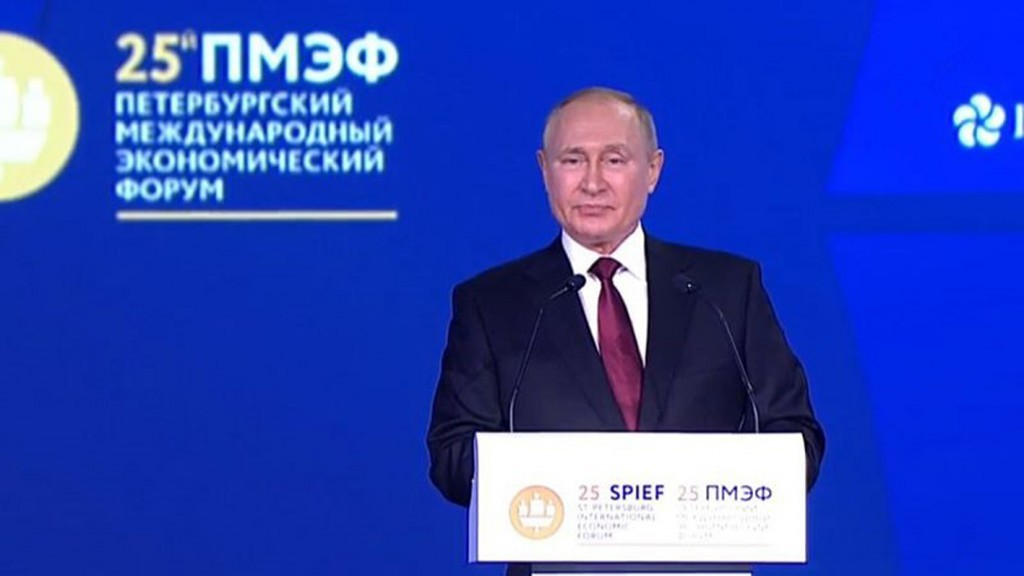
A hydrogen bomb
What does it mean for there to be a new global currency based on the BRICS currencies and the GDP of the BRICS countries?
In short, it means that the global financial and economic system has changed forever, and that the dominance of the dollar has ended, at least over a part of the world that makes up more than a third of the world in terms of area, population, and economy (if we assume that the BRICS countries will be isolated from the rest of the world with their new world order, which is an assumption that is completely far from reality), and it reaches more than half of the world if we take into account the weight of these countries in the global market and their relations and agreements with a huge number of countries, including the Belt and Road.
Not to mention that the dollar is inflated and in crisis, and with it the American economy, to the point that it is almost inevitably guaranteed its not-too-distant comprehensive collapse with its expulsion from large areas of the global exchange market. That is, the exposure of its horrific inflation, and its transformation into mere pieces of paper dyed green. This is in full swing and will accelerate astronomically with the actual launch of the new currency.
Moreover, a global currency based on real production, and valued based on it, means ending the unequal exchange, and consequently ending the process of historical plunder that has alluded Americans and Europeans over the past centuries to believe that they own the planet. This also carries with it great implications of a comprehensive change in the entire international political system, starting from the UN and including all regional and local organizations.
What deepens the crisis of the West, and strengthens BRICS and its alternative currency, is the objective fact related to the movement, not only of capital, but of a significant volume of the real production processes, from the countries of the Western center towards the East, over the past hundred years.
The law regarding the tendency of the rate of profit to fall as the complexity of the organic composition of capital increases, which played a key role in the production of Western colonialism in its old and new phases, is the same law that produced the movement of real production processes towards the global east and south. It is also the same law that transformed the Western center into a tax collector and a global thief that produces as little as possible and plunders as much as possible. It is also the same law that today allows movement towards the new global currency based on production and not on inflationary fraud.
That is, the transition that is taking place, albeit symbolic, has the power of a hydrogen bomb against the West, but this time a peaceful one. Perhaps what is more important than that is that it is greater and deeper than the nonsense of moving from an “imperialist center” to “another imperialist center”, which some Western economists give today a symbolic name: the transition from petrodollars to “petroyuans”.
In essence, the ongoing transition, and because it is based on linking real production and currency, opens the door to a major transition in the entire socioeconomic structure of the planet, the first step of which is ending unequal exchange among countries.
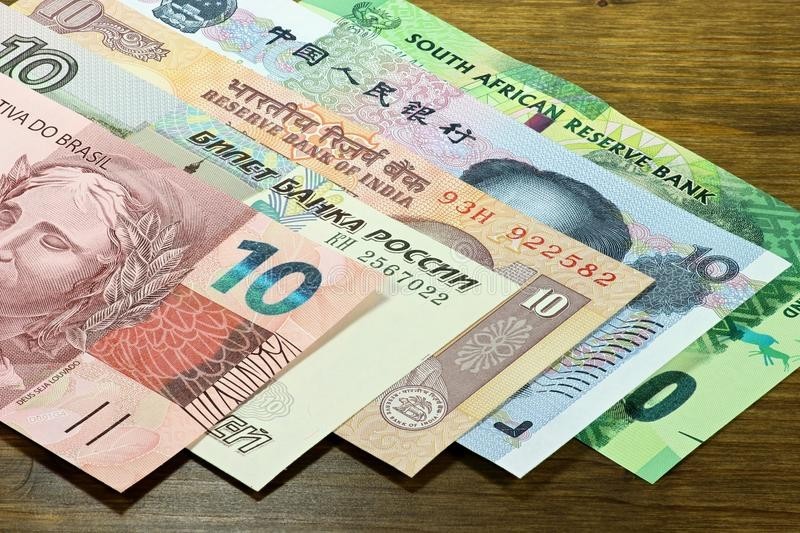
What is next?
If the use of the peaceful hydrogen bomb we discussed above has caused a major shock to the negotiation processes under the table, or rather to the West’s attempts to throw a bait to Russia by conceding Ukraine, in exchange for preventing the use of this particular bomb, this does not mean in any way that the negotiations is completely behind us, and no new attempt will be made after a while that may not be long, perhaps in the fall or winter of this year. The battle has become existential in every sense of the word, and the West does not have many tools to engage in it, so it will use those tools in an attempt to obtain better conditions, and perhaps it will try again to work from within the BRICS countries, especially Russia, because the attack from the outside has no practical prospects.
This implies that the objective processes particularly inside Russia, China, and India, will be accelerated by external pressure, and the transition away from “unequal exchange” will become the first task on the agenda, not only within the external conflict, but also within the internal conflict. That is, the internal capitalist plundering will turn into the number one enemy for each of China, Russia, and India, which also means that the objective tendency will be strengthened rapidly towards the adoption of radically different socioeconomic policies than what is prevalent.


